By Onno Geveke originally published in Medium
What if we would reach all employees in their learning efforts, not just the ‘happy few’ in a management development program or the ‘once a year refreshments’? What if we can create learning environments which help people becoming the best version of themselves? ‘An Everyone Culture’ is talking about organizations that prosper when they are deeply aligned with one of their workers’ strongest motives: to grow. These Deliberately Developmental Organisations (DDO) have people’s ongoing development woven into the daily routines and conversations. What are potential practices that can be a driving force towards a DDO?
What is a Deliberately Developmental Organisations (DDO)? Aligning the organization to people’s motives to grow, means fostering a culture where development is part of the daily practice and routines.
A DDO has created a safe enough culture that eveyone comes out of hiding and can show up as the best version of themselves. Blind spots are known, strengths are known, people support each other in the process of overcoming their limitations.
In a DDO, the relationship between organizational and human potential is a logical one. When the employees are growing, the organization will grow, giving space again for employees to grow.
At the level of culture, it is about integrating deeper forms of personal learning into every aspect of life in the company.
A DDO as a concept can be described in three dimensions:
· Home: the depth of its developmental communities
· Groove: the breadth of its developmental practices
· Edge: the height of its developmental aspirations
All three dimensions integrated will bring a dynamic DDO system in view. What would it look like if organizations and employees are partners in each other’s flourishing? Creating space for all three dimension at the same time will together foster a deliberately developmental organization.
Within these three dimensions, twelve features are recognised as departures to create a continuous and immersive focus on people development. These are not just tweaks of current standard practices, but a fundamental different way of orchestrating explicitly and in harmony to produce an immersive developmental culture. As the authors say: “at the level of culture, it is about integrating deeper forms of personal learning into every aspect of life in the company.
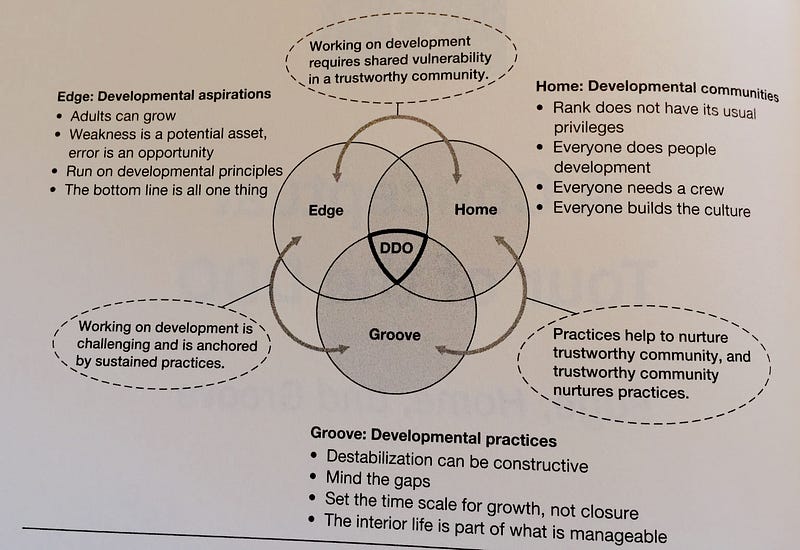
What are practices that potentially have a positive impact towards a DDO?
Looking at what the authors share, I have come across some practices in my work which for me relate to working towards a Deliberately Developmental Organization. As there is no ‘one way to go’ here, these examples are all merely invitations to start experimenting with….
- Bring purpose into play. One of the breakthroughs in creating organizations where people can be their whole self is aligning the purpose of the organization and individual purpose as a person (Reinventing Organizations — Frederic Laloux). If development is part of the purpose of a DDO, then alignment between ‘what is my personal desired future and what is the development to that’ and the ‘desired development for the organization’ should be part of a continuous conversation. A supporting question to share could be: ‘how can I serve the organization in its development, and how can the organization serve me in my development?’.
- Start experimenting with positive, strength based practices for development. It is not only our limitations or ‘screwing up’ where growth is possible. More and more we come to an understanding that by focusing our attention on our strengths and on ‘what is working well already and do we want more of’, we unleash the energy for positive development of ourselves and the organization.
Take for example the philosophy of Appreciative Inquiry, founded on the principle that human systems move in the direction of what they focus on and talk about regularly. “People learn and organizations change most readily when they focus on, study, and engage in dialogue about strengths, patterns of success and who they are when they are at their best.”
A first practice to consider might be adding a ‘success inquiry’ in your team meetings. Ask each member ‘what has been working really well for you in the last month’ or ‘what are you really proud of right now’. These types of check-in questions support building positive relationships and energy within the team and for each individual. It creates space to bring our authentic self into the conversation.
- Create a learning environment ‘by and for the people’, giving opportunities to grow by teaching others. You might call that an in-house academy, more importantly it is a sustainable learning environment dedicated to create space for individual and collective learning moments. Linked into the corporate strategy, the academy connects into all stakeholders in the organization through a networked way where every employee is a co-creator of that academy. The academy facilitates conversation around all three dimensions of the DDO:
– what are our development aspirations and how can we support those?
– where can development take place in a participatory environment?
– what practices work well here or should we add, and how can we reinforce those?
In the light of primary and secondary processes, we might even say that ‘development’ becomes the primary process of the organization. Through development we create new products, services or innovation in general.
- In a DDO, managers and leaders are coaches and mentors in the complex, ongoing process of organizational adaptation of which everyone in the DDO is a part. They are instead shapers of the conditions and structures that will allow crew members on the front lines to continually participate in improving the way they work. The DDO dimension ‘Home’ involves lessons around a more participatory workplace community.
What can we do to start experimenting with more participatory approaches? An evolving practice is the Art of Hosting approach. It blends a suite of powerful conversational processes to invite people to step in and take charge of the challenges facing them. A first step to consider might be organizing an ‘open space’ facilitated session. Starting with a central theme and framing, the space is open for anyone to start a session topic. Participants create and manage their own agenda of parallel working sessions where they share their questions and work together towards possible steps forward, suggestions, solutions.
As said, leaders shape the space for conversation and idea generation, and are an equal participant during the open space process.
What would it look like when you start experimenting with one or more of these practices? I have written this blog as an invitation to be bold; start building capacity and learning what is working for you and what you would like to do more off.
What resonates most to you now? What questions are you holding? What bold step would you like to take forward?
Permission to republish granted by the author.
Featured Image/Graphic link added by Enlivening Edge Magazine.
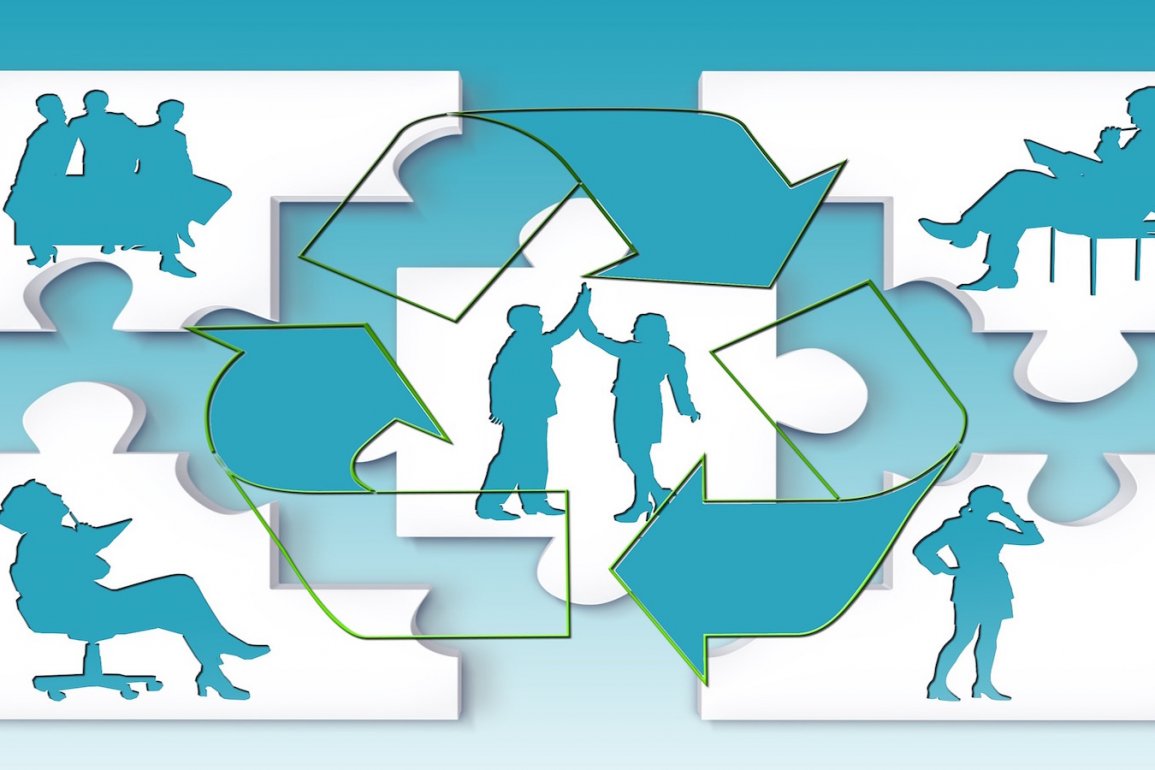

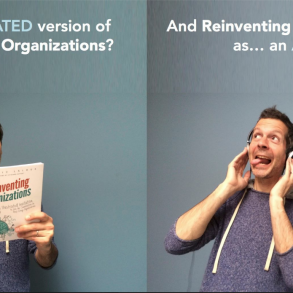
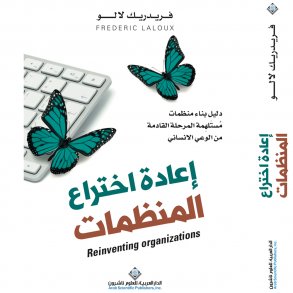
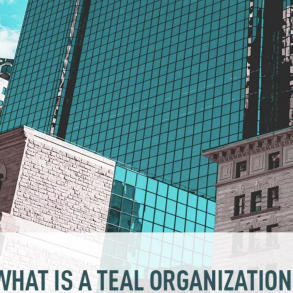
About one year later, I notice a growing invitation to start practicing new tools as a parallel proces to understanding DDO and complexity. Sometimes I am hearing: I do not understand what DDO means yet, so I cannot move forward. My question then is: what if starting the practice will help you to understand and learn? And from there you will figure out what the potential of DDO might be for you? The art of getting started.